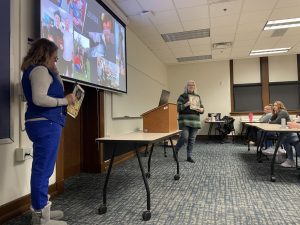Class availability affects graduation date
Students, faculty discuss non-semesterly classes
Though most departments have “major maps” to help students sort through available courses, many students still struggle when classes are offered once a semester and that can sometimes mean the difference between graduating and staying an extra semester.
November 7, 2018
Many classes offered by Winona State University are not available every semester, which can create issues for students.
There are many reasons for this kind of a schedule.
J. Paul Johnson, English professor and mass communication chairperson, explained why departments within the university do this.
“There are multiple reasons for that. One would be faculty availability. A second would simply be programmatic need. A third is just a simple case of curricular and academic planning,” Johnson said.
Johnson explained that the department will look at the sequence in which the classes need to be offered and when they need to be offered to give students the ability to graduate on time.
Winona State Provost Patricia Rogers expanded on the reason for this kind of a schedule by stating that some classes might not be filled if they were offered both semesters, which means that classes like general education classes are offered every semester.
“We really try to make sure that [general education classes] are offered very, very often. Those that are more selective courses, let’s say they are upper division and maybe they are very specialized, they may only have room in that faculty member’s schedule to offer that kind of a course once a year,” Rogers said.

Courses like this are a common occurrence at Winona State and can mean the difference between graduation and more time at the university.
In total, Winona State has just over 20 classes that are taught only one semester every year, according to the Academic Affairs Office.
Rogers said that 83 percent of departments have “major maps” on their websites to make students aware of these offerings.
However, many students still struggle with these classes being offered once an academic year. For some students, it can be the difference between graduating or staying an extra semester.
Renny Hubbard, a senior English writing, applied and professional writing and applied English literature major, only needed one more class to graduate, but ended up having to do independent studies.
“Pedagogical grammar is only offered in the spring, but then every third spring it is not offered at all. And this spring happens to be that spring where it is not offered,” Hubbard said. “So, I talked to the chair and I could do independent studies to cover it, I need permission. But I might find another work-around, like staying another year and getting my master’s.”
Hubbard did not get advice from his advisor on what to do about the issue, he found it online.
“I do see my advisors, but they mostly just check to make sure it sounds right. If I knew that it wasn’t going to be offered this spring, I probably would have switched it out and taken it last spring,” Hubbard said.
Though it will work out for Hubbard, many students are not so lucky.
In a Facebook comment, two students said that they had to take classes at another university and transfer those credits just to graduate.
“I had this issue, it didn’t stop me from graduating but I took classes at other colleges to be able to graduate on time,” alumna Anne Mills said in a comment.

According to the Winona State Academic Affairs Office there are just over 20 classes that are only offered one semester each year.
Another person commented, saying that the IDesign program has many classes that are offered in this way.
However, if an IDesign student misses or fails one of the classes that student would be a year behind.
There are a few solutions for students struggling with this issue.
One is talking to the department and advisors about possibly substituting another class for the one that is required.
Tania Schmidt, senior associate registrar, said that her office processes more than 800 substitution requests a semester.
“Many times, those courses can be course subbed for a course that is being offered. The departments are sometimes fairly good about working with students,” Schmidt said.
Rogers also said that professors, advisors and the Warrior Hub are good sources to talk to.
Schmidt also mentioned that if a student has concerns on this topic or any other, to bring it to Student Senate.
“Is there a college that is worse than another, are some colleges helping students through this more than others? I think Student Senate would be the place to ask these questions,” Schmidt said.

There are several reasons why some courses are offered infrequently like faculity availability, class size, need or academic planning. Advisors are supposed to help students plan for courses that may be required but are only offered once a year, but what often happens is students have to figure their schedules out on their own while the advisor simply signs off on the plan.
However, some students have said that their advisors did not help them with this issue, they figured it out by themselves.
“I just looked it up,” Hubbard said.
Hubbard continued by saying that the university could be more informative in what to do in this situation and that advisors should be required to mention this when classes are offered and what to do when a student cannot get into one.
“Be more informative about it. I know that I do most of the planning by myself. I do see my advisors, but they just check to see if it sounds like you know what you are doing,” Hubbard said. “If I knew that wasn’t going to be offered this spring, I would have switched it out for something that was.”
Schmidt adds that bringing up the solutions in the freshmen orientation classes will help those students in the future.
“I think it is probably also something that we can bring up for orientation, like for Ron Strggie’s area as he roles our orientation 100 with curriculum that maybe they can cover that to incoming freshman, so they know they can use it later,” Schmidt said.
Schmidt also said that part of the reason that students might not be aware of the solutions to class offerings is because advisors “forget” to tell their students.
“I think because that information is known by advisors and chairs, we think that they are the ones that are telling [students] and maybe they are not because they see 70 to 80 students, they forget to tell you,” Schmidt said.
However, Winona State is not the only school who offers classes once every academic year or on another varied schedule.
“Most institutions have one or two year only offerings, it’s not just us,” Schmidt said. “We actually have a very low number compared to some other schools. And again, simply because we have to rotate that content and rotate what the faculty teaches, etc.”




































dr. punit goyal • Jun 10, 2019 at 5:07 am
thanks for sharing this post and as u talk about Class availability affects graduation date
is really amazing